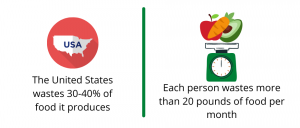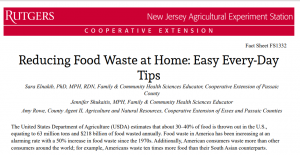Food Waste at Home

Making a few changes to your household can help reduce food waste.[2]
- Pre-plan your food list before going to the grocery store and stick to it! Only buy what you need. Be careful when buying in bulk and think before you buy.
- Purchase fruits and vegetables that have some physical imperfections, as these items often do not get purchased due to their look but are safe to consume!
- Store fruits and vegetables properly to make them last longer.
- Make sure your refrigerator is set to 40° Fahrenheit or below and your freezer is set to 0° Fahrenheit to prevent foods from spoiling faster than they should.
- Designate a space in the front of your fridge for foods that will be going bad sooner to ensure that you eat those foods first.
- Keep track of what you have stored in your kitchen and base your meals around what you have on hand.
- If you notice you have extra food, consider donating food items to your local food pantry or share food with family/friends instead of throwing it away.
Click on the images below to learn more about how you can reduce your household food waste:



Want some tips with ordering take out? Click here.
Check out additional resources from Rutgers Cooperative Extension:
Preventing Food Waste at Home Webinar Reducing Food Waste at Home: Easy Every-Day Tips

